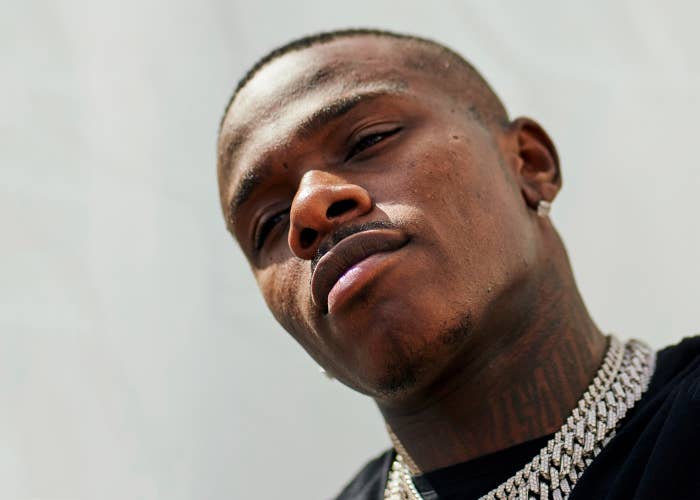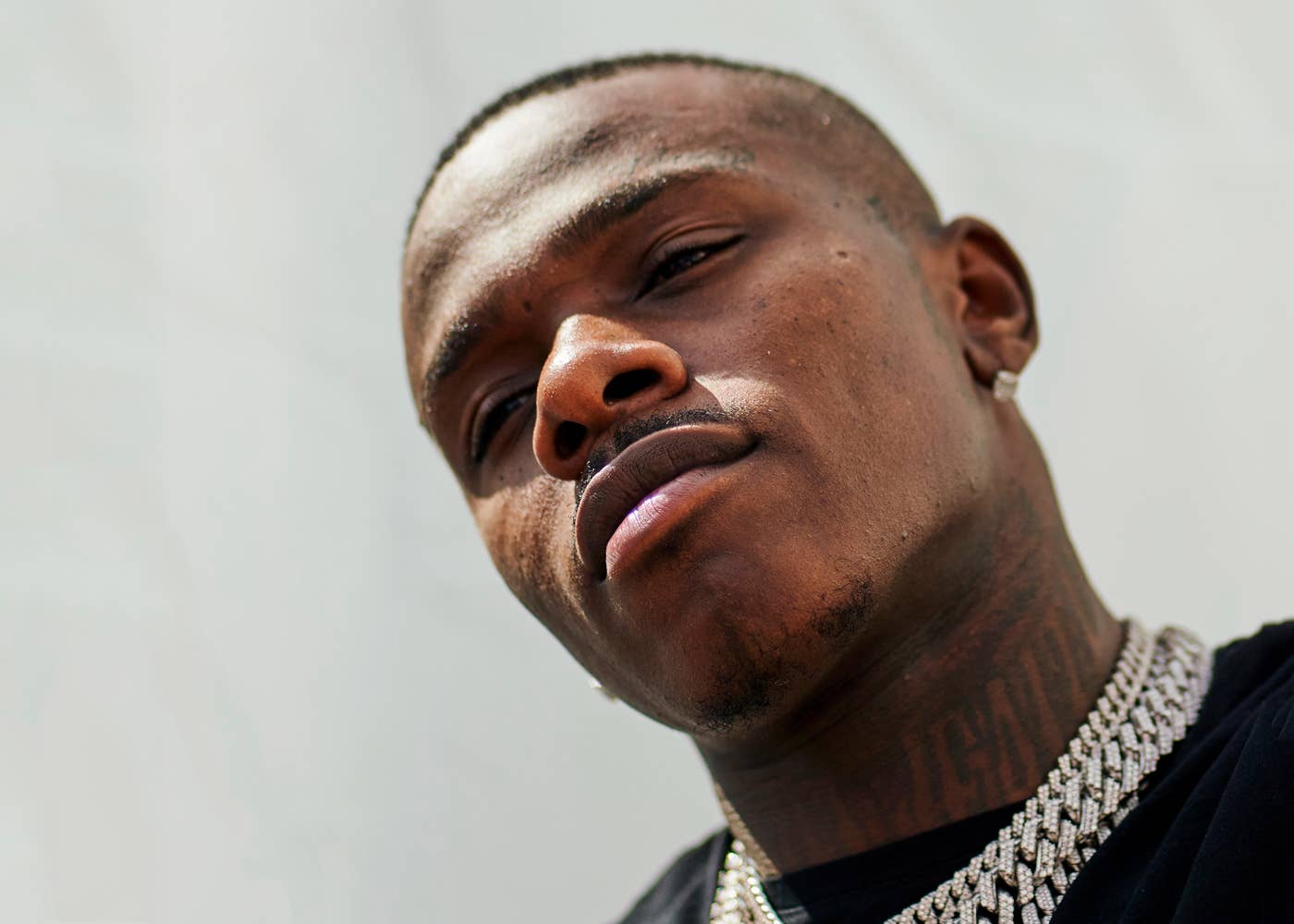
When DaBaby stormed onto the mainstream rap scene earlier this year with Baby on Baby, he presented a sharply refined persona. His character was spelled out letter by letter thanks to excessively silly videos, a relentlessly consistent flow, and a blend of humor and menace that suggested a rapper willing to beat your ass and then laugh about it.
Behind the scenes, the rapper born Jonathan Kirk spent years crafting DaBaby, using his Baby Talk mixtape series (five in all) to market test his particular style. By the time Baby on Baby came in March of this year, he had perfected it. He was the undisputed champ of South By Southwest in 2019, headlining seemingly every worthwhile showcase, backed by his large entourage and literally standing on the shoulders of his even larger bodyguards. Shortly afterwards, “Suge” became inescapable. On paper, the Offset-assisted “Baby Sitter” seemed like the surefire hit, but “Suge” found resonance on the streets, in NBA locker rooms, and on the Instagram Story of your favorite celebrity. It turned DaBaby into a star.
DaBaby’s rise took him across the country multiple times over and brought him a level of stardom few rappers achieve. He stole the show on every remix he appeared on, and was the standout on every track he lent a verse to. He single-handedly carried a staid song on Post Malone’s new album, hopped on the remix of Lizzo’s inescapable “Truth Hurts,” and managed to hold his own as a guest artist on Lil Nas X’s musical meme, “Panini.” 2019 has felt infinitely long for many reasons, but DaBaby’s rise has been somehow both steady-building and rapid. He’s rap’s Rookie of the Year, but it feels like he’s been running the game for a few years. His impact has been that big.
And yet, the man behind the Baby, Jonathan Kirk, is still a bit of a mystery. DaBaby is an open book, and a ‘what you see is what you get’ persona; Jonathan Kirk has hidden behind that. With Kirk, out today, he aims to write his history without taking away from his signature chaotic blend of shit-talking and celebrations. He succeeds with thrilling results.
While DaBaby ruminates on death and family, he also builds his songs with signature one-liners, each seemingly better than the last.
“Intro” immediately sets the stakes. This is a new Baby, maybe not an adult, but certainly out of the house and confronting the world and its unrelenting march of confusion, tragedy, and chaos. “And I'm just somewhere fucked up thinkin’ about my father and shit,” he raps. “They found him dead a couple days before I started tour/Same day I flew back to the city from Miami/I was out there with the family.” There’s a depth to Kirk that immediately becomes clear, something that was obfuscated amidst the joyous debauchery of Baby on Baby. He continues, “Just lookin' at my daughter/Thinkin' to myself like, damn, my baby look just like my daddy/Same time I got the news/My shit went number one, that's fucked up.” As DaBaby was ascending personally and professionally, his father died, a tragedy that shapes the album in spirit if not in content.
While DaBaby ruminates on death and family, he also builds his songs with signature one-liners, each seemingly better than the last. On “There He Go,” produced by London On Da Track, Baby raps, “Now I’m somewhere in a meeting gettin’ my ass kissed/By a white man ‘cuz his daughter fucks with my adlibs.” Kirk will be praised for its depth, its emotional explorations, and DaBaby refining his voice, but the album would fall flat if he wasn’t able to balance these deeper themes with his signature wit and snarling gravitas.
Baby on Baby succeeds for many reasons, but part of its appeal is how effortlessly cool Baby sounds throughout. The entire record is so precisely attuned to the rapper’s strengths, that he comes across as nonchalant and completely in control. On Kirk, everything sounds and appears more calculated. That’s the risk of the major label world, and DaBaby handles it better than most, but it’s easier to spot the gears churning here than it is on Baby on Baby. He knows how many features to include, how many hooks need to be crooned for the radio, and how many rapping-his-ass-off bars must be spit to retain a certain portion of his audience. These are all minor flaws, but DaBaby is no longer catching us by surprise. Kirk is under a microscope, and the occasional crack appears.
If there’s another complaint to file here, it’s that the guest features scattered throughout slow DaBaby down more than they enhance his voice at times. It’s ironic, considering the tremendous use other rappers and singers have gotten from his bars, but here, Baby might have been better left alone. This is his show. “Gospel” features Chance, Gucci Mane, and YK Osiris, and the crowded bunch sounds more bloated than communal. The Nicki Minaj-assisted “iPhone” leaves something to be desired, although Baby’s singing voice is surprisingly strong. “Raw Shit” with Migos takes a spooked piano line and mesmerizingly interplays the trio’s voices against Baby’s, but the energy stagnates.
There are some good collaborations, though. “Toes” works, mostly because of the whistle-led Kenny Beats production and the surprising chemistry between Moneybagg Yo and Lil Baby. “Pop Star” is a self-aware look at Baby’s rise, pre-empyting any accusations of radio reaches for commercial fame as Kevin Gates bounces up and down the musical scale. You can’t sell out when the songs are this good.
Even though Baby on Baby is a certified hit—it reached No. 7 on the Billboard Top 200 (it’s still at 23)—Kirk feels like a coming-out party. Perhaps it was the way the former sprung up into our collective conscience, or maybe it’s because this is the first time we’re truly getting to know the man who orchestrates stage shows with giant inflatable babies. Either way, Kirk is a triumph, and even rarer, it sounds true. DaBaby is more complex than his debut LP led us to believe, and his ability to express a complicated array of emotions within the span of one bar is a singular talent. With Baby on Baby, Jonathan Kirk became a star. On Kirk, he’s still that, but you don’t need access to private jets or six zeroes in your bank account to relate.




